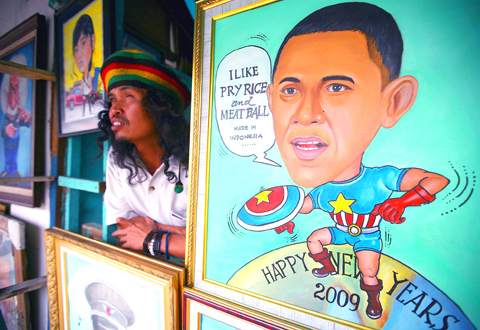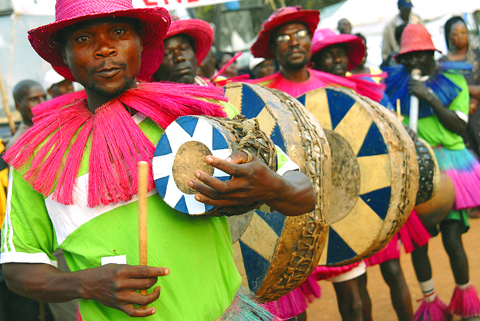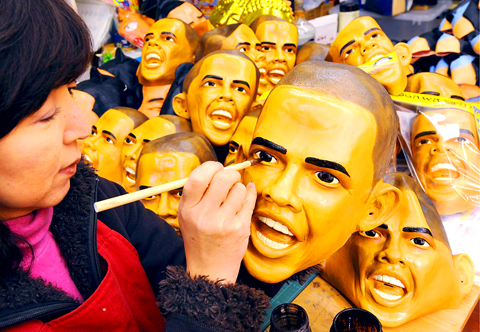From stock traders to battle-weary soldiers to everyday citizens glued to their television screens, the world was awaiting incoming US president Barack Obama’s swearing-in yesterday and the dawn of a new era of US leadership.
Hours before the first black president in US history draws the curtains on the George W. Bush era, the weeks of excited anticipation were coming to an end with the somber recognition of Obama’s difficult work ahead.
“Just being elected has allowed Mr Obama to make Americans feel their country has been lifted to another plane,” said the Sydney Morning Herald in Australia, summing up the feelings of the new president’s strongest supporters.

PHOTO: EPA
It is sometimes said, half in jest, that choosing the US president is too important to be left only to Americans, and Obama was clearly the choice of many people around the world after eight years of the deeply unpopular Bush.
“I don’t think I’ve ever seen a time where the international community was so excited about the election of an American president,” former US secretary of state Madeleine Albright told the BBC.
A BBC poll of people in 17 countries found that most — an average of two-thirds — believed Obama would improve the relationship between the US and the rest of the world.

PHOTO: AP
Obama inherits a wobbly global economy, bloody conflicts in Afghanistan and Iraq, and a US whose international standing is widely seen to be lower than any time in living memory.
He also comes to power with massive expectations, on everything from climate change to Middle East peace to disarming North Korea, and analysts have already warned many of those expectations are unrealistic.
Spanish Prime Minister Jose Luis Zapatero said the world economic crisis could be shortened if Obama’s administration inspires confidence. But Russian Prime Minister Vladimir Putin did not hesitate to pour cold water on the hopes of optimists.

PHOTO: EPA
“I am deeply convinced that the biggest disappointments are born out of big expectations,” Putin said.
That bit of plain speaking underlined the difficulties that lie ahead for Obama, whose wide popularity will soon enough brush up against the need to take the unpopular decisions of leadership.
He has already acknowledged that dismantling the “war on terror” prison camp at Guantanamo Bay would not be done as swiftly as once thought.
“It is clear that Mr Obama’s election campaign promises are going to be kept slowly, if at all,” Thailand’s Bangkok Post said. “The new president has little adult experience of world affairs.”
In Indonesia, the world’s most populous Muslim nation where Obama spent four years of his childhood, the Jakarta Post said he would be seen with affection as a “brother” — but was also not the answer to every problem.
“Many in Indonesia, as well as in other Muslim nations, have certain expectations that the new US president is not likely to be able to meet,” it said.
But for one day at least, the focus will be on the pomp and pageantry, on the hopes for Obama and the US, and all that he has come to represent in his surprising run to capture the White House.
“Tomorrow he will be prey to politics as usual. Tomorrow he will be, perhaps, just another president,” the Indian Express newspaper said. “But leave till tomorrow the concerns and carping: Today he is not just a president-elect, not just a president — he is a symbol of all that the democratic spirit can hope to achieve, of the promise of power open to all,” it said.

In the sweltering streets of Jakarta, buskers carry towering, hollow puppets and pass around a bucket for donations. Now, they fear becoming outlaws. City authorities said they would crack down on use of the sacred ondel-ondel puppets, which can stand as tall as a truck, and they are drafting legislation to remove what they view as a street nuisance. Performances featuring the puppets — originally used by Jakarta’s Betawi people to ward off evil spirits — would be allowed only at set events. The ban could leave many ondel-ondel buskers in Jakarta jobless. “I am confused and anxious. I fear getting raided or even

POLITICAL PATRIARCHS: Recent clashes between Thailand and Cambodia are driven by an escalating feud between rival political families, analysts say The dispute over Thailand and Cambodia’s contested border, which dates back more than a century to disagreements over colonial-era maps, has broken into conflict before. However, the most recent clashes, which erupted on Thursday, have been fueled by another factor: a bitter feud between two powerful political patriarchs. Cambodian Senate President and former prime minister Hun Sen, 72, and former Thai prime minister Thaksin Shinawatra, 76, were once such close friends that they reportedly called one another brothers. Hun Sen has, over the years, supported Thaksin’s family during their long-running power struggle with Thailand’s military. Thaksin and his sister Yingluck stayed

Kemal Ozdemir looked up at the bare peaks of Mount Cilo in Turkey’s Kurdish majority southeast. “There were glaciers 10 years ago,” he recalled under a cloudless sky. A mountain guide for 15 years, Ozdemir then turned toward the torrent carrying dozens of blocks of ice below a slope covered with grass and rocks — a sign of glacier loss being exacerbated by global warming. “You can see that there are quite a few pieces of glacier in the water right now ... the reason why the waterfalls flow lushly actually shows us how fast the ice is melting,” he said.

RESTRUCTURE: Myanmar’s military has ended emergency rule and announced plans for elections in December, but critics said the move aims to entrench junta control Myanmar’s military government announced on Thursday that it was ending the state of emergency declared after it seized power in 2021 and would restructure administrative bodies to prepare for the new election at the end of the year. However, the polls planned for an unspecified date in December face serious obstacles, including a civil war raging over most of the country and pledges by opponents of the military rule to derail the election because they believe it can be neither free nor fair. Under the restructuring, Myanmar’s junta chief Min Aung Hlaing is giving up two posts, but would stay at the